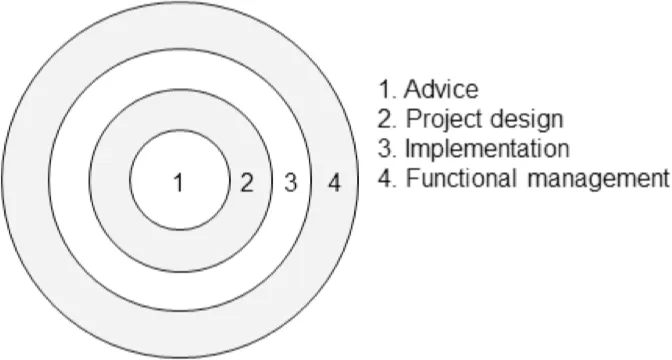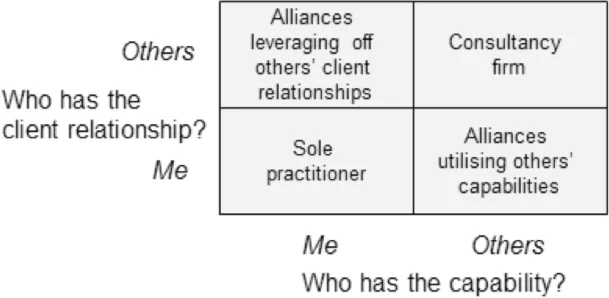
eBook - ePub
Mastering Management Consultancy
Calvert Markham
This is a test
Buch teilen
- 192 Seiten
- English
- ePUB (handyfreundlich)
- Über iOS und Android verfügbar
eBook - ePub
Mastering Management Consultancy
Calvert Markham
Angaben zum Buch
Buchvorschau
Inhaltsverzeichnis
Quellenangaben
Über dieses Buch
Mastering Management Consultancy is a comprehensive guide for all consultants looking to provide a first-class service to their clients and who wish to become expert practitioners.
Calvert Markham shows how consultants can develop their performance in a wide range of areas, including:
- Product development and marketing consultancy.
- Selling and managing consultancy projects.
- Consultancy problem solving.
- Running a consultancy business.
- Managing client relationship
Häufig gestellte Fragen
Wie kann ich mein Abo kündigen?
Gehe einfach zum Kontobereich in den Einstellungen und klicke auf „Abo kündigen“ – ganz einfach. Nachdem du gekündigt hast, bleibt deine Mitgliedschaft für den verbleibenden Abozeitraum, den du bereits bezahlt hast, aktiv. Mehr Informationen hier.
(Wie) Kann ich Bücher herunterladen?
Derzeit stehen all unsere auf Mobilgeräte reagierenden ePub-Bücher zum Download über die App zur Verfügung. Die meisten unserer PDFs stehen ebenfalls zum Download bereit; wir arbeiten daran, auch die übrigen PDFs zum Download anzubieten, bei denen dies aktuell noch nicht möglich ist. Weitere Informationen hier.
Welcher Unterschied besteht bei den Preisen zwischen den Aboplänen?
Mit beiden Aboplänen erhältst du vollen Zugang zur Bibliothek und allen Funktionen von Perlego. Die einzigen Unterschiede bestehen im Preis und dem Abozeitraum: Mit dem Jahresabo sparst du auf 12 Monate gerechnet im Vergleich zum Monatsabo rund 30 %.
Was ist Perlego?
Wir sind ein Online-Abodienst für Lehrbücher, bei dem du für weniger als den Preis eines einzelnen Buches pro Monat Zugang zu einer ganzen Online-Bibliothek erhältst. Mit über 1 Million Büchern zu über 1.000 verschiedenen Themen haben wir bestimmt alles, was du brauchst! Weitere Informationen hier.
Unterstützt Perlego Text-zu-Sprache?
Achte auf das Symbol zum Vorlesen in deinem nächsten Buch, um zu sehen, ob du es dir auch anhören kannst. Bei diesem Tool wird dir Text laut vorgelesen, wobei der Text beim Vorlesen auch grafisch hervorgehoben wird. Du kannst das Vorlesen jederzeit anhalten, beschleunigen und verlangsamen. Weitere Informationen hier.
Ist Mastering Management Consultancy als Online-PDF/ePub verfügbar?
Ja, du hast Zugang zu Mastering Management Consultancy von Calvert Markham im PDF- und/oder ePub-Format sowie zu anderen beliebten Büchern aus Business & Consulting. Aus unserem Katalog stehen dir über 1 Million Bücher zur Verfügung.
Information
Thema
BusinessThema
Consulting1
THE NATURE OF CONSULTANCY
One hundred years ago the management consultancy industry did not exist; now, consultancy is globally a multi-billion dollar industry, covering many service lines in addition to advice to management. Organisations have in recent years increasingly outsourced more peripheral activities and consultancy firms have responded with an expanding range of services.
Now, consultancy firms have expanded to include thousands of consultants handling large-scale projects and process outsourcing activities, while at the same time there is a horde of sole practitioners and small firms delivering more modest consultancy services to their clients. So, what is this consultancy business?
In this chapter we will consider what consultancy is, why consultants are engaged, the nature of the organisations delivering consultancy services, and the skills required of consultants.
WHAT IS CONSULTANCY?
One of my first assignments as a management consultant was with one of the London teaching hospitals. I heard that a colleague was a patient in one of the wards and I wanted to know which one, so I phoned the appropriate department. Information was given only reluctantly over the phone, until I was asked who I was. ‘I’m a consultant and she’s a member of my firm,’ I replied, honestly. There was a sound of clicking heels as the person at the other end of the phone came to attention – and I got the information I wanted immediately. ‘Consultant’ and ‘firm’ then had quite different (and more potent) meanings in a hospital.
At one extreme the term ‘consultant’ simply refers to the nature of engagement between an individual and an organisation; the consultant is a person who is acting in a contracted rather than an employed capacity. Beyond this, the word is applied in a variety of occupations; as well as the senior doctor and the management consultant, it can be used to describe anybody who is providing knowledge-based services to an organisation from outside. So a wider definition of the term ‘consultant’ could also include solicitor, accountant, architect, engineer or, indeed, any profession.
A simple definition of consultancy is ‘delivering specialist skills in a client environment’. Key concepts in this definition are:
• Specialist skills: The assumption is that the consultant has specific skills, both in demand and valued by the client organisation, and it is for this reason that the individual consultant has been engaged.
• Outside the organisation: The consultant is usually from another organisation or, if an internal consultant, from a different department within the organisation. This has been extended to the concept of ‘business partner’ – an internal service provider (for example, from the HR department) who has been assigned to a business unit to work in a consultative capacity with them – who also needs consulting skills.
Although any provider of professional services might be regarded as a consultant (and their methods of winning business and handling clients will have much in common), the matters on which management consultants are engaged are around helping organisations define and implement their development agendas. The development agenda is not only about doing new things, but also about doing existing things better.
The nature of management consultancy interventions has evolved, as shown in Exhibit 1.1. As the diagram shows, consultants can be involved at a number of levels:
Exhibit 1.1 Evolution of activities in a consultancy practice

Providing advice: This work might answer a question such as: “What is the reward package needed to attract a good marketing manager?”
Project design goes a step further, answering a question such as: “How do we ensure that our reward packages remain competitive?”
Implementation goes a step still further: “Install a new reward system for this business that gives better value for money”.
Functional management takes on running a complete function: “Please run our reward system on our behalf”.
Each stage represents an increased level of outsourcing and a larger ‘footprint’ for the consultancy practice in the client organisation. For example, an HR manager may be charged with managing a company reward system and decide to initiate a project to ensure that reward remains competitive, enlisting the help of consultants to design this (level 2), which she then implements (level 3). These steps therefore represent an evolving degree towards ‘buy’ in terms of a strategic ‘make or buy’ decision.
WHY USE CONSULTANTS?
All organisations have suppliers – of utilities, raw materials and so on. Organisations need to decide what they should source internally and what they should buy in the ‘make or buy’ decision.
The structure of business has changed radically over the last 30 years: whereas large corporations would have had teams of in-house specialists to help with projects as and when required, the consequence of successive cost cutting exercises has been that many specialist departments have closed. Specialist expertise is now externally resourced – not only in consultancy and other professions, but also in many other areas – for example, office cleaning, running canteens and security. Activities that are not vital to the core of the business are sub-contracted and there are now many very large businesses that have flourished because of this trend.
So the principle of using specialist outsiders is established. The next question is: on what activities should they be engaged?
The obvious answer is where organisations do not have the quality or quantity of resource to achieve the results desired. A simple analogy: you want to replace the central heating system in your house; if you do not know how to do this, you will probably engage a plumber to do it for you. Or, you may be able to do it, but have insufficient time to do so, in which case you would again sub-contract the work.
There are three other factors that organisations may also take into consideration in deciding whether to sub-contract:
1. Objectivity: Will insiders bring the independence and freshness of view that an outsider would bring?
2. Risk: Bringing in outside experts should mitigate the risks of the project failing (and, if you are cynical, will provide an obvious scapegoat if it does!)
3. Learning, in which there are two questions to consider:
- How will our organisational knowledge be increased as a result of using consultants and learning from them?
- What opportunities for learning among our own people will be lost by engaging outside consultants?
Taking the central heating analogy above, for example, you may wish to work alongside the plumber if you want to learn how to install central heating systems for yourself in future. But how often would you expect to need to do this? Would it be a worthwhile investment of your time that would lead to future benefit?
These factors are also relevant to the use of internal consultants. The value of establishing an internal consultancy practice is that it allows the development of a centre of excellence in an area of specialist activity that would not be economically viable if diffused throughout an organisation. Moreover, leading-edge practice is not always available from external consultancies. Organisations may be able to acquire learning and capability in areas relevant to their business more easily than consultants. In many situations a joint client-consultant team can therefore be very effective.
THE NATURE OF CONSULTANCY PRACTICES
There are clear benefits in consultants associating. Quite apart from the economies of scale in sharing administrative overheads, there is far more likelihood that the right blend of skills to address clients’ issues will be available from a group of consultants than from a sole practitioner.
There are two major tasks in consultancy, both of which take time: acquiring engagements, and executing them. Exhibit 1.2 shows how consultants can leverage the two resources required to carry these out – their network of client contacts, and their specialist skills.
Associations of consultants can vary from a loose network through to a formally constituted practice. The latter will have a well-developed infrastructure with consultants trained in using shared procedures, based on capabilities derived from accumulated corporate experience when working with clients. In recent years large consultancy practices have flourished, developing on a global basis and taking on massive projects, either by themselves or as part of a consortium, the latter often involving partners from quite different kinds of business.
Exhibit 1.2 Consultants in combination can better win and operate assignments

Muzio, Kirkpatrick, and Kipping have suggested that consulting has proceeded as a series of three waves, and suggested a look to the future in a fourth. They have typified the first three respectively – which have developed over the last 100 years – as Engineers, Strategists and IT Integrators, with characteristics as follows:
First wave: Engineers | • Application of scientific management to improve work-flow and production processes • Level of intervention: shop floor • Engineering knowledge-base and background • Flat structures and charismatic authority • Federations of national entities • High levels of autonomy |
Second wave: Strategists | • Provide high level advice on strategic issues • Level of intervention: corporate headquarters • Development of proprietary management methodologies, frameworks and techniques • Reliance on MBA graduates • Collegiality and partnership • Moderate leverage, team work, up or out culture • Personalisation strategies |
Third wave: IT Integrators | • Deal with ICT requirements of increasingly networked forms of organisations • IT focused/driven advice • Level of intervention: relations... |